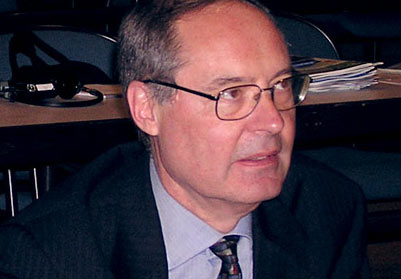ETHICAL PRINCIPLES NECESSARY FOR THE WELL BEING OF ALL
Posted on: 13/Sep/2010 3:35:07 AM

Dr Ian Magrath, president of the International Network for Cancer Treatment and Research in Brussels, Belgium was delivering the first oration at the Adyar Cancer Institute to commemorate the contributions of Dr. S. Krishnamurthi to cancer care.
Addressing Ethical issues, Dr. Magrath said whether it was the Gita discourses or Buddhist philosophy, there were �tremendously deep lessons to be learnt from these scriptures.� The quintessence of ancient Eastern philosophy that advocated selflessness, an appreciation of the miracles of the universe, and respect for nature holds great contemporary value, he said. Dr. Magrath`s lecture on �Science, Religion and Humanity, a personal perspective,� took the audience on an existential journey through the beginnings of the universe, energy quarks with flavours, Hubble imagery of amazing structures in the sky and bright stars that are factories of chemicals and elements. The vast tracts of knowledge had helped mankind harness technology to develop state-of-the-art medical equipment, he said.
According to Dr. Magrath, some of the new ethical issues in medical science that owed to the advancement of technology were in the use of embryos grown in culture for �spare parts,� insurance against knowledge of the existence of multi-genetic predisposition, advancement of highly expensive pre-disease therapy or genetically modified food crops. Dr. Magrath called for determining ethical principles in the wider human context, including short-term and long-term consequences, and applying science and religion in a way that ensured the well-being of the planet as a whole. He pointed out that science and religion were components of the human condition roughly corresponding to the rational and emotional elements of the mind.
And, while both were essential for the future of the human race, ethics too was imperative for survival of mankind, Dr. Magrath said.
V. Shanta, Cancer Institute Chairman recalled the uphill struggle that Dr. Krishnamurthi had to overcome to set up the Cancer Institute at a time when cancer was thought of as a disease of destiny and without cure.
Dr. Krishnamurthi, who had prescience about the importance that palliative care in cancer management was also an early advocate of multimodal approach to cancer treatment, she said.







